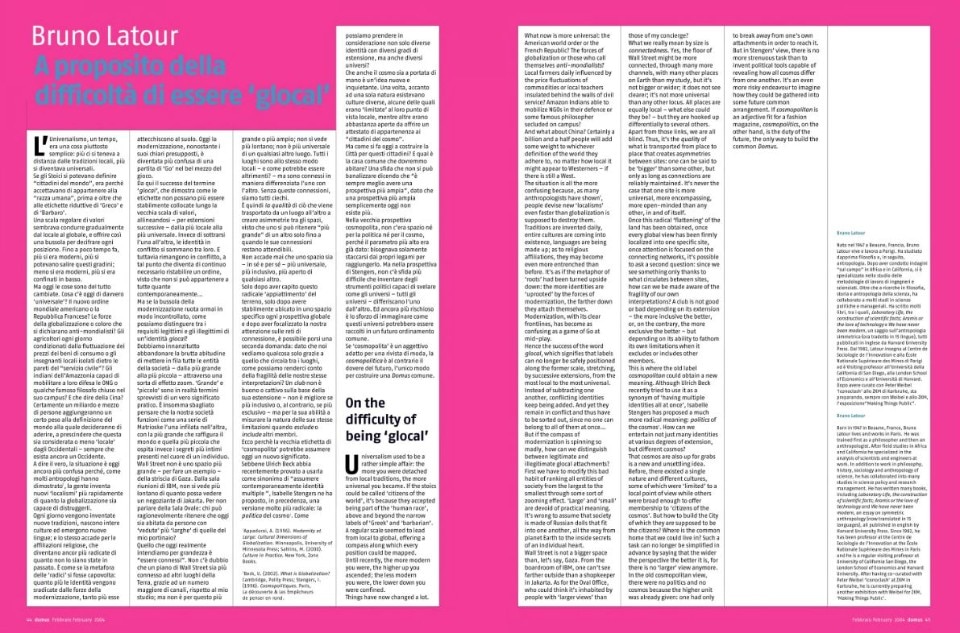This editorial was published on Domus 867 in February 2004.
Universalism used to be a rather simple affair: the more you were detached from local traditions, the more universal you became. If the stoics could be called ‘citizens of the world’, it’s because they accepted being part of the ‘human race’, above and beyond the narrow labels of ‘Greek’ and ‘barbarian’.
A regular scale seemed to lead from local to global, offering a compass along which every position could be mapped. Until recently, the more modern you were, the higher up you ascended; the less modern you were, the lower down you were confined.
Things have now changed a lot. What now is more universal: the American world order or the French Republic? The forces of globalization or those who call themselves anti-mondialists? Local farmers daily influenced by the price fluctuations of commodities or local teachers insulated behind the walls of civil service? Amazon Indians able to mobilize NGOs in their defence or some famous philosopher secluded on campus? And what about China? Certainly a billion and a half people will add some weight to whichever definition of the world they adhere to, no matter how local it might appear to Westerners – if there is still a West.
The situation is all the more confusing because, as many anthropologists have shown, people devise new ‘localisms’ even faster than globalization is supposed to destroy them. Traditions are invented daily, entire cultures are coming into existence, languages are being made up; as to religious affiliations, they may become even more entrenched than before. It’s as if the metaphor of ‘roots’ had been turned upside down: the more identities are ‘uprooted’ by the forces of modernization, the farther down they attach themselves. Modernization, with its clear frontlines, has become as confusing as a game of Go at mid-play.

Hence the success of the word glocal, which signifies that labels can no longer be safely positioned along the former scale, stretching, by successive extensions, from the most local to the most universal. Instead of subtracting one another, conflicting identities keep being added. And yet they remain in conflict and thus have to be sorted out, since no one can belong to all of them at once… But if the compass of modernization is spinning so madly, how can we distinguish between legitimate and illegitimate glocal attachments?
First we have to modify this bad habit of ranking all entities of society from the largest to the smallest through some sort of zooming effect. ‘Large’ and ‘small’ are devoid of practical meaning. It’s wrong to assume that society is made of Russian dolls that fit into one another, all the way from planet Earth to the inside secrets of an individual heart. Wall Street is not a bigger space than, let’s say, Gaza. From the boardroom of IBM, one can’t see farther outside than a shopkeeper in Jakarta. As for the Oval Office, who could think it’s inhabited by people with ‘larger views’ than those of my concierge? What we really mean by size is connectedness. Yes, the floor of Wall Street might be more connected, through many more channels, with many other places on Earth than my study, but it’s not bigger or wider; it does not see clearer; it’s not more universal than any other locus. All places are equally local – what else could they be? – but they are hooked up differentially to several others. Apart from those links, we are all blind.
It’s wrong to assume that society is made of Russian dolls that fit into one another, all the way from planet Earth to the inside secrets of an individual heart.
Thus, it’s the quality of what is transported from place to place that creates asymmetries between sites: one can be said to be ‘bigger’ than some other, but only as long as connections are reliably maintained. It’s never the case that one site is more universal, more encompassing, more open-minded than any other, in and of itself. Once this radical ‘flattening’ of the land has been obtained, once every global view has been firmly localized into one specific site, once attention is focused on the connecting networks, it’s possible to ask a second question: since we see something only thanks to what circulates between sites, how can we be made aware of the fragility of our own interpretations? A club is not good or bad depending on its extension – the more inclusive the better, or, on the contrary, the more exclusive the better – but depending on its ability to fathom its own limitations when it excludes or includes other members.

If cosmopolitan is an adjective fit for a fashion magazine, cosmopolitics, on the other hand, is the duty of the future, the only way to build the common Domus.
This is where the old label cosmopolitan could obtain a new meaning. Although Ulrich Beck recently tried to use it as a synonym of ‘having multiple identities all at once’, Isabelle Stengers has proposed a much more radical meaning: politics of the cosmos. How can we entertain not just many identities at various degrees of extension, but different cosmos?
That cosmos are also up for grabs is a new and unsettling idea. Before, there existed a single nature and different cultures, some of which were ‘limited’ to a local point of view while others were broad enough to offer membership to ‘citizens of the cosmos’. But how to build the City of which they are supposed to be the citizens? Where is the common home that we could live in? Such a task can no longer be simplified in advance by saying that the wider the perspective the better it is, for there is no ‘larger’ view anymore. In the old cosmopolitan view, there were no politics and no cosmos because the higher unit was already given: one had only to break away from one’s own attachments in order to reach it. But in Stengers’ view, there is no more strenuous task than to invent political tools capable of revealing how all cosmos differ from one another. It’s an even more risky endeavour to imagine how they could be gathered into some future common arrangement.
If cosmopolitan is an adjective fit for a fashion magazine, cosmopolitics, on the other hand, is the duty of the future, the only way to build the common Domus.


